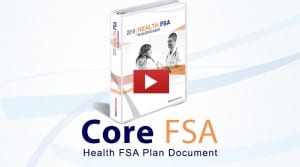Home / Blog / There's still time to use 2023 Health FSA balances, more items eligible
There’s still time to use 2023 Health FSA balances, more items eligible
As we come to the end of the year, don’t forget to use 2023 health FSA money. In 2024, your Health FSA can be used for far more than in previous years. That’s thanks to the expansion of eligible OTC products that do not require a prescription, granted by the 2020 CARES Act.

Use-it-or-lose-it FSA plans turn over on December 31 each year.
The Health Flexible Spending Arrangement (Health FSA) is a Section 125 Cafeteria plan group health benefit that allows employees and employers to contribute funds that the employee (and dependents) can use to pay eligible medical expenses with tax-free dollars.
Every year, millions of people abandon tax-free dollars in a Health FSA because the funds go unused. Often, these are resources a household really can’t afford to lose, but what can you do?
Well, this year, you can stock up on the usual Health FSA-eligible items and now, you can use 2021 Health FSA funds on many over-the-counter (OTC) medications that used to require a prescription.
In fact, if people knew just how flexible a Health FSA is when it comes to what it can buy, very few of us would have a surrendered balance. That’s because good health isn’t only about prescriptions, co-pays, and deductibles, but wellness in general. And that means using those funds to make more general health purchases all through the year.
Which OTC products are eligible to use 2020 Health FSA money?
Here’s a list of 2021 Health FSA-eligible items you can buy without a prescription. New items for 2020 in the CARES Act are emphasized:
- Acne light therapy
- Acne medication and treatments*
- Antacids and acid reducers*
- Anti-arthritis medications*
- Antibacterial gels and ointments*
- Anti-diarrheal products and laxatives*
- Antihistamines and allergy prevention and treatment drugs*
- Anti-itch medications and creams*
- Athletic and orthopedic braces and supports
- Breast pumps and accessories
- Blood glucose monitors and testing strips
- Blood pressure monitors
- Cold and flu remedies*
- Condoms
- Contact lenses and supplies
- Decongestants*
- Denture cream and cleansers
- Diaper rash creams and ointments*
- Eye drops
- First aid supplies and kits
- Glucosamine supplements
- Hemorrhoid treatments*
- Hot and cold packs
- Incontinence supplies
- Lip balm
- Medical supplies*
- Medicated lotions and sunscreens*
- Medicated personal products*
- Menstrual cramp relief products*
- Menstrual hygiene products (pads, tampons, etc.)*
- Motion sickness aids
- Nasal spray
- Oral care products*
- Pain relievers, including menstrual and migraine relief products*
- Pregnancy and fertility tests
- Prenatal vitamins
- Reading glasses
- Shoe insoles and inserts
- Sinus products*
- Sleep aids*
- Smoking cessation products*
- Sunscreens with SPF ratings of 15 and above
- Sunscreens with SPF ratings below 15*
- Thermometers
- Vaporizers and inhalers
- Walking aids and wheelchairs
Shopping for Health FSA-eligible items
As you can see from the lists, you can use 2023 Health FSAs to cover items used every day. So, you probably know where to buy them, but does that matter to your FSA plan?
Not at all. Shop for them at the drug store or grocery store; at major big-box retailers, or a locally-owned market or pharmacy. Just be sure to get a receipt that clearly shows what you purchased with the price you paid.
Use 2023 Health FSAs online
And, of course, you can buy Health FSA-eligible items online.
Health FSAs have become so popular that major pharmacies like Walgreens and CVS have dedicated online FSA shops. You’ll also find the FSA Store which, as its name hints, deals solely with Health FSA-eligible items. Most recently, Amazon has entered the field for Health FSA-eligible items with its own specialty shop. All of these online stores make it easy to find what you need and keep a record of FSA purchases.
Paying for FSA-eligible purchases
There are two ways to use 2023 Health FSAs to pay for eligible items:
Benefits Debit Card
Most online vendors and many local brick-and-mortar stores accept benefit debit cards for Health FSA items. If you don’t already have one, ask your Health FSA administrator if your benefit plan offers this convenience.
Reimbursement Claim
When a store does not accept benefit debit cards, or if one is not available through your Health FSA plan, you will have to buy the item(s) with your own funds and then be reimbursed by your employer.
Submit a claim request using the form your employer provides for reimbursement. The form may be on paper or it could be through an online benefits portal.
Simply fill out the form and attach your (paper or scanned) receipt. Your repayment will arrive quickly, usually in fewer than 30 days. Be sure to keep a copy of all claim forms and receipts you submit.
CARES Act retroactive to January 1, 2021
The CARES Act covers these new non-prescription OTC items beginning January 1, 2020. That means you can submit a claim to your Health FSA for reimbursement on previous purchases. You will need a receipt, but may not be out of luck on that if you used a shoppers card tied to an app or made the purchase online.
Check your Health FSA plan rules
You may have other options than to quickly use 2021 Health FSA dollars by the end of the year. Some plans allow a year-end carryover of FSA funds (up to $640) into the next year, while others offer a grace period of up to 2-1/2 months into the new plan year to use up any year-end balance. All Health FSAs can now cover the newly eligible items, but be sure to ask if your plan is also covered by CARES Act 2020 COVID-19 relief for Section 125 FSAs. That option was made available to restore FSA funds that may have been lost at the end of 2020, at the employer’s option.
Employers can enjoy online administration services, including a debit card for employees’ Health FSA purchases, for $10 or less per employee, per month, with CoreAdmin services.
Related Videos

